Podcast Ep #18: Founding a Food Co-op
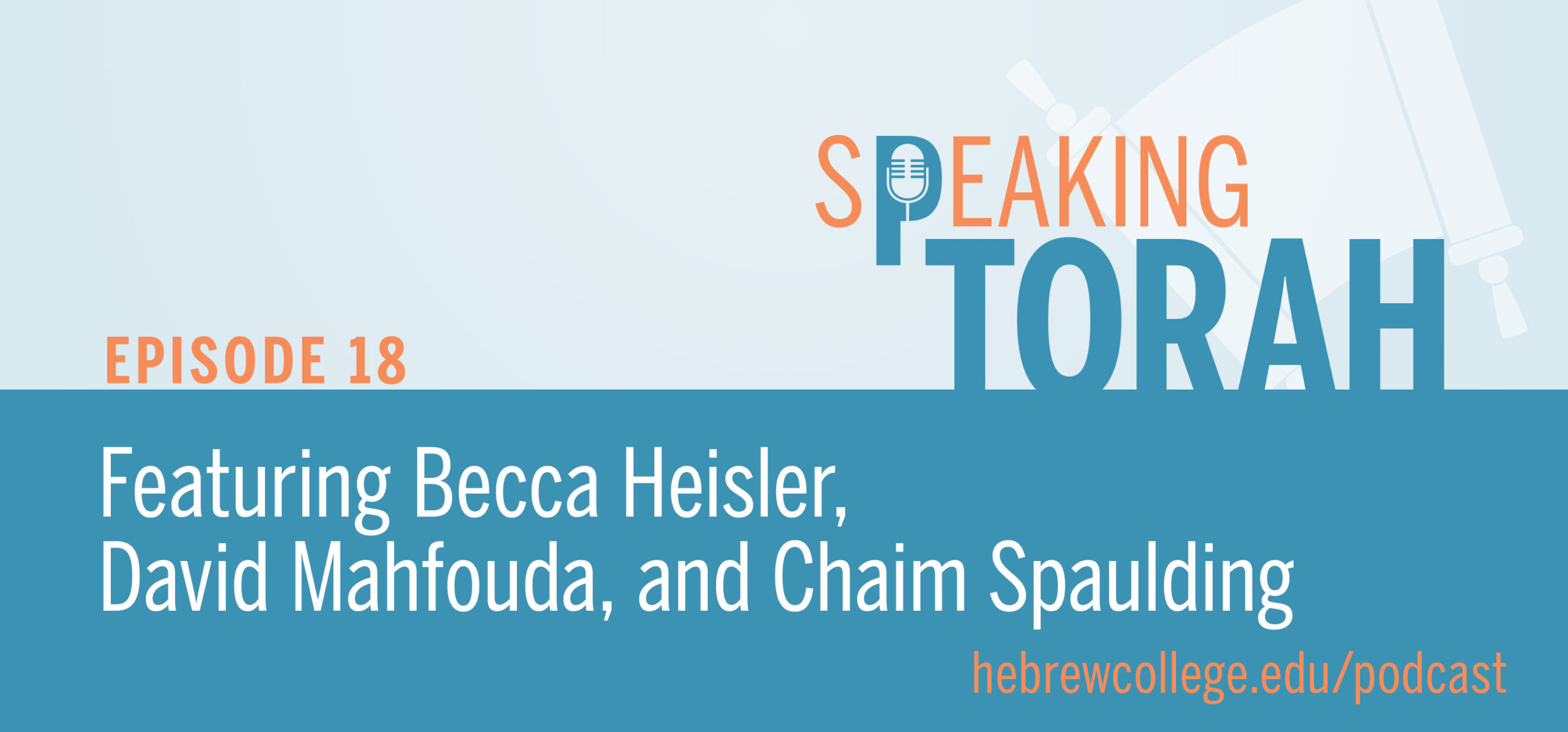
One phrase that’s been living in my mind a lot recently is, hachnasat orchim, welcoming guests, which is sort of Jewish expression as a value of hospitality. And I think hospitality has built into it a lot of reciprocity and a lot of mutual aid. There’s always, in my mind, the expectation that in a well-functioning community, everyone is hosting and everyone is guesting and there’s a handing off and a taking turns of taking care of each other.
– Chaim Spaulding, Rabbinical Student
This week, we’re pleased to bring you a discussion with three Hebrew College rabbinical students, Becca Heisler, David Mahfouda, and Chaim Spaulding, who have started a food co-op for the Hebrew College community.
Finding both a need and an opportunity, Becca, David, and Chaim have been able to provide healthy and fulfilling lunches for students while, in the process, creating community, leading with their Jewish values of kashrut, hospitality, and avodah.
Using local sources, students work together in preparing the meals, taking turns, and sharing responsibilities. Spending all day filling up your brain can only sustain you for so long, but the Food Co-op brings minds and bodies together, nourishing the stomach as well as the heart.
Tune in today to learn how the Shul Lunch Cooperative at Hebrew College was created, hear about the Jewish values that guide these three founders in their mission, and discover how they’re encouraging other communities to consider similar programs of service.
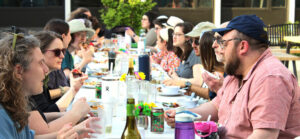
Listen to the Full Episode:
Listen on Apple Podcasts | Google Podcasts | Spotify
Read more about the Coop here.
What You’ll Discover from this Episode:
- How the Hebrew College Food Co-op was created.
- The Jewish values that have given life to this Food Co-op.
- How the Lunch Co-op has been fostering connection, love, and community at Hebrew College.
- The cooperative framework of the Lunch Cooperative, informed by Jewish texts and traditions.
- How many synagogue shuls lie dormant for most of the week and could be utilized for coops just like this one.
- Why running the Lunch Cooperative is great support for these young founders’ clergy training.
- How David, Chaim, and Becca are planning to support other communities in undertaking similar projects.
Featured on this Episode:
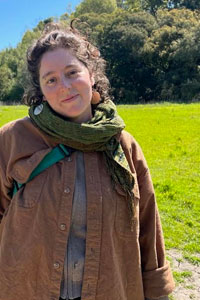 Becca Heisler (she/her) is an outdoor educator, ritualist, caregiver, youth mentor, and folk herbalist who is currently in her second year at Hebrew College. Before starting rabbinical school, she spent six years making home in Lisjan Ohlone territory (Berkeley/Oakland, CA), facilitating Jewish outdoor education programs and guiding earth-based rites of passage for youth K-12 and adults of all ages. She is currently the co-coordinator of the Shul Lunch Coop, having a blast cooking & sharing meals with classmates, teachers, and community.
Becca Heisler (she/her) is an outdoor educator, ritualist, caregiver, youth mentor, and folk herbalist who is currently in her second year at Hebrew College. Before starting rabbinical school, she spent six years making home in Lisjan Ohlone territory (Berkeley/Oakland, CA), facilitating Jewish outdoor education programs and guiding earth-based rites of passage for youth K-12 and adults of all ages. She is currently the co-coordinator of the Shul Lunch Coop, having a blast cooking & sharing meals with classmates, teachers, and community.
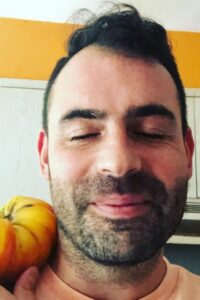 David Mahfouda (he/him) is a Rabbinical Student and Teaching Fellow at Hebrew College, and recent Student Rabbi at Congregation Or HaTzafon in Fairbanks, Alaska. Prior to attending Hebrew College, David was an artist and curator at the Proteus Gowanus Gallery in Brooklyn, where he co-founded the Fixers Collective — an anarchist repair community that gathered weekly to fix broken things.
David Mahfouda (he/him) is a Rabbinical Student and Teaching Fellow at Hebrew College, and recent Student Rabbi at Congregation Or HaTzafon in Fairbanks, Alaska. Prior to attending Hebrew College, David was an artist and curator at the Proteus Gowanus Gallery in Brooklyn, where he co-founded the Fixers Collective — an anarchist repair community that gathered weekly to fix broken things.
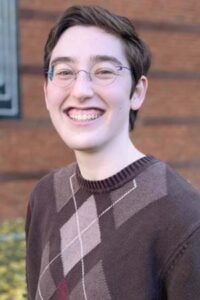 Chaim Spaulding (they/them) is a third-year rabbinical student at Hebrew College. Outside of school, they love to hike, dance, nurture local and long-distance friendships, write, sing, cook, and curl up with tea and a good book.
Chaim Spaulding (they/them) is a third-year rabbinical student at Hebrew College. Outside of school, they love to hike, dance, nurture local and long-distance friendships, write, sing, cook, and curl up with tea and a good book.
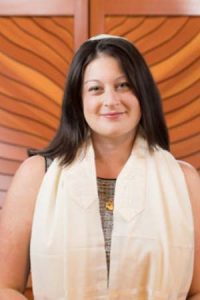 Rabbi Jessica Lowenthal `19 (Host) is the spiritual leader and Education Director at Temple Beth Shalom in Melrose, MA. She was ordained in 2019 at Hebrew College. Before attending rabbinical school, Rabbi Jessica was Assistant Regional Director at the Anti-Defamation League in Boston, working with partners like MIRA (Massachusetts Immigrant and Refugee Advocacy Coalition) and MassEquality. She holds an MBA in non-profit management and MA in Jewish Leadership from the Hornstein program at Brandeis University and a BA from George Washington University in Religion and Judaic Studies.
Rabbi Jessica Lowenthal `19 (Host) is the spiritual leader and Education Director at Temple Beth Shalom in Melrose, MA. She was ordained in 2019 at Hebrew College. Before attending rabbinical school, Rabbi Jessica was Assistant Regional Director at the Anti-Defamation League in Boston, working with partners like MIRA (Massachusetts Immigrant and Refugee Advocacy Coalition) and MassEquality. She holds an MBA in non-profit management and MA in Jewish Leadership from the Hornstein program at Brandeis University and a BA from George Washington University in Religion and Judaic Studies.
A special thank you for this episode’s musical contributions:
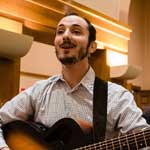 Intro by: Rabbi Jackson Mercer `23
Intro by: Rabbi Jackson Mercer `23
Jackson is the Base Rabbi for Boston. Collaboration and creativity are at the core of his desire to cultivate meaningful Jewish experiences. Through his work, Jackson built singing prayer communities across the country in California, New York, and Boston. He also founded and built a Judaica brand, Hiddur Mitzvah, with his partner and fellow artist Rachel Jackson and sings with R’ Josh Warshawsky in the Chaverai Nevarech Band.
Esa Einai (Psalm 121:1)
Music by Jackson Mercer
Guitar and Melody by Jackson Mercer
Harmonies by Cantor Rosalie Will, Ilana Sandberg, Rabbi Micah Shapiro, Rabbi Josh Warshawsky, Noah Diamondstein, Ryan Leszner, Eliana Light.
“Pitchu Li”
From Zeh Ha-Sha’ar, an album by Rabbi Micah Shapiro `17, Musican-in-Residence (remote), Mishkan Chicago, Chicago, IL.
Rabbi Jessica Lowenthal: Welcome to Speaking Torah. I’m your host, Rabbi Jessica Lowenthal, spiritual leader of Temple Beth Shalom in Melrose, Massachusetts and 2019 graduate of Hebrew College. In this podcast, Jewish leaders from around the world read essays, tell stories, and share projects from Hebrew College faculty, alumni, and students about how Torah can help us navigate the most pressing issues of our time. Together, we explore the ways Torah could help us approach the world with creativity, healing, and hope.
This week, we’re pleased to talk to three Hebrew College rabbinical students, Becca Heisler, David Mahfouda, and Chaim Spaulding, who have started a food coop for the Hebrew College community.
Finding both a need and an opportunity, Becca, David, and Chaim have been able to provide healthy and fulfilling lunches for students while creating community. Leading with their Jewish values of kashrut, hospitality, and avodah.
Using local sources, students work together in preparing the meals, taking turns, and sharing responsibilities. Spending all day filling up your brains can only sustain you for so long, The Food Coop brings minds and bodies together, nourishing the stomach as well as the heart.
You can learn more about Becca, David, and Chaim on the Speaking Torah webpage at hebrewcollege.edu/podcast.
—
Rabbi Jessica Lowenthal: Where did the idea for a food coop originate?
David Mahfouda: I’ve had this idea for a long time about wanting to open a cooperative cafeteria. And part of what I was excited about was thinking about how people can come together around making and sharing a meal, and thinking about what kind of training I might need to be able to do that in a way that was meaningful and that held people in their difference.
The rabbinate was the closest that I could come to, to think about what kind of role might be able to facilitate meaning-making and connection in that kind of community space.
Also, when I was an applicant, through Hebrew College, I met a current student named Giulia Fleishman who I also talked to about this cafeteria idea, and Giulia also said, “Oh, you should do that at school.” And I said, “No, that seems dumb. I don’t want to do it at school. It shouldn’t happen at school.”
And it’s happening at school and I think it’s such a perfect – perfect isn’t the right word. I think it’s a nurturing environment to think about, nurturing and nourishing a community.
Becca Heisler: One of the reasons that I got excited to join David in making this project come to life is the tension that I feel between the often-gendered roles of leadership in the Jewish community. And as someone who loves cooking and also have done a lot of work of taking care of people in community, in various ways, including food and ritual and other ways of bringing people together, including a lot of children, I was excited to bridge that gap a little bit between the world of care work as a form of leadership, and Torah study as a form of preparing for leadership in the Jewish community. Care work being historically a project of Jewish women and Torah study historically being a project of Jewish men, and wanting to live in the queer space in between.
Rabbi Jessica Lowenthal: What Jewish values do you see as giving life to the coop?
Chaim Spaulding: One phrase that’s been living in my mind a lot recently is, hachnasat orchim, welcoming guests, which is sort of Jewish expression as a value of hospitality. And I think hospitality has built into it a lot of reciprocity and a lot of mutual aid. There’s always, in my mind, the expectation that in a well-functioning community, everyone is hosting and everyone is guesting and there’s a handing off and a taking turns of taking care of each other.
And I think part of the beauty of the Lunch Coop being a coop is everyone who is eating is also serving and everyone who is serving is also cooking and everyone who is cooking is also eating and nobody has to do all of it at once. It’s a real passing of labor and passing of care, fluidly, hopefully, and easefully, and lovingly between different members of the community. And that generates abundance for everyone, so much more so than if we were each trying to do the labor individually.
Becca: Kashrut is also a value that’s at play here. And I don’t mean just halachic debate of what’s kosher and what’s not and how do you need to wash the greens to check for bugs, although details, I am not a mashgiah at this time. So, there’s a lot that I’m still learning about the practical and detailed aspects of kashrut.
But kashrut on the whole, as an invitation to look very carefully and closely at where our food comes from and how it arrives on our tables, feels really connected to this project. And part of what we’re doing is not just navigating the really complex world of kashrut in a pluralistic community, but also thinking about how to balance the competing needs of how to get food onto the table that is affordable, that is as local and as regenerative as we can do within the constraints that we’re working with.
And we have aspirations to be connecting with local food growers, to be able to source produce that’s from the land where we’re living and working, or at least as close as possible to it, because coming together around food that’s from the place where we are is also a project of belonging, which exists on multiple levels.
So, placing our project and the food that we’re making as belonging within the ritual and halachic constraints of kashrut and also belonging to this place and also belonging at the table together in community, just sort of layers on layers of what it means to consider what kashrut is in this communal context.
David Mahfouda: Something that’s been exciting for me in thinking about putting this together is the dual meaning of avodah as like both labor and service, devotional service. So I think part of what we’re doing when we’re training for the rabbinate is helping our communities understand their work as devotional, and so I think part of what I’m hoping for in the coop and in the work of the coop is that really feels like part of the culture and the way it feels to prepare a meal for this community.
So, I’m really hoping that working will feel like worship, like a connection with the community and the divine.
Chaim Spaulding: And I’ll say, I was there on the first Sunday that we cooked our very first pilot meal for the community ad it was just a bunch of us in the Temple Reyim kitchen on a Sunday afternoon and we were there working for several hours, and it was a little chaotic.
We didn’t quite know our way around the kitchen yet, and it felt so joyful. It felt like an experience of connection and love and community. And it really felt like we were putting all of that love and connection into the food that we were making and we were so excited to make it for everyone else. And it had that feeling of sacredness to it.
—
Rabbi Jessica Lowenthal: How does the coop work?
David Mahfouda: We’re still figuring that out. We have our first membership meeting today. One of the things that we’re going to talk about is specifically what does it mean to be a member, what obligations are there, like as a test of membership? And what are the permissions?
Sorry, I’m laughing because Becca and I were talking about this last night and Becca came up with a halachic framework for thinking about both the obligations and permissions of being associated with the coop, or being a member of the coop.
And I think that’s something – that’s another big open question for me and also something that I’m really excited about, is thinking about how to take this idea of a coop, which my relationship to it is pretty western, kind of like a legalistic understanding of how organizations function in the United States, and have this project be informed by our Jewish texts and traditions.
I think the basic direction that we’re heading in is having a membership whose obligations are work and payment for food, and then having that membership democratically elect a board who is responsible for keeping the coop on mission.
We haven’t defined a mission statement yet, but that’s something we’re also hoping to do in community and in committee. And there are also a couple of paid positions that either a hiring committee will elect or the board will elect or the membership will elect whose job is more functional, just making sure that people are showing up for shifts, ordering foods, creating relationships with vendors, all of the nitty-gritty that is necessary in order to run a kitchen that serves a couple meals a week to a community. Members can sign up either for two meals a week or about four meals a week.
Becca Heisler: Temple Reyim’s kitchen is the place where we’re preparing all of this food and this is not the only synagogue whose kitchen sits empty or unused for much of the week. There are a lot of shuls in a lot of places that have industrial kitchens of various sizes and setups that are really ripe for use and really underutilized.
And I’ve seen this in a lot of different communities where I’ve been, that there are out there a lot of people who need food, and a lot of kitchens that are not used to their fullest potential.
So, I’m excited to be in the experimentation of what it looks like to collaborate on kitchen use, which includes kashrut and also attending relationships and figuring out how to meet our needs amongst the many demands on the building and the space.
We’re trying to create an organizational structure that isn’t set up like a normal organizational hierarchy or nonprofit organizational setup. We’re really trying to experiment with what it means to be a collective and to share responsibility and accountability and also to be collectively engaged in the process.
And people can opt in to giving more of their time or less of their time, depending on what their capacity is. But having many forms of leadership and many ways to get involved and support, and I think this is also really important training for us as clergy, to see different kinds of organizational structures and to build the skills that it takes to maintain a collective.
Rabbi Jessica Lowenthal: You ran a pilot lunch for the community in September that looked amazing. How was that experience?
Becca Heisler: David did some grocery shopping. And we also went to a local farm. There’s a farm at Gann Academy in Waltham that was started by Noah Weinberg a number of years ago. And I had the incredible privilege and delight of working there this summer and spending time there with some very, very wonderful small children, getting to learn and grow and play and snack at the farm.
So, we had the delight of getting to go there and spend about an hour harvesting zucchini and cucumbers and tomatoes and basil and parsley.
David Mahfouda: For the two coop meals that we’ve created so far, we’ve intentionally done that. We’ve circled around at the food. We’ve looked at each other. We’ve offered gratitude, offered blessings. And so, part of what’s so exciting about the project is learning about and evolving a food culture.
Something that I’m excited about is creating specific roles for people to take on ritual leadership opportunities, both in cooking a meal and in enjoying and sharing a meal.
So, we’re going to have a number of weekly work shifts that are more production related and practically oriented. And then there will also be spaces for people to take on ritual leadership roles and roles for teaching.
So, one of the things that I’m really excited about is this project as a context for developing our ritual leadership skills and developing our ritual vocabulary for enjoying and acknowledging and being grateful for food.
Rabbi Jessica Lowenthal: I see you have a position for a coop storyteller. What do you envision that person doing?
David Mahfouda: I’m hoping that the storyteller role will kind of play two functions. One, to help record stories and memories and process for how the coop came together, both as a resource for the coop in the future, as a way of building and retaining institutional memory.
And I’m also hoping that the storyteller’s role will make available to other communities the learning that we’re developing about how to support each other, nurture each other, both in a really practical way like, “These are the first meetings we had and this is where the finding came from and this is how we organized and this is how we’re voting…” as a template and hopefully a way to support other communities in creating similar projects.
The other place that this came from is studying Talmud. Just getting super excited about the idea of Talmud as an archive, an archive of stories and laws and just basically a pretty chaotic large document about how to do Judaism in a lot of different contexts. And so, I’m hoping the storyteller can learn from that model of archiving and how valuable it can be to future communities in thinking about relationship to their own identities.
I think something that Talmud does really well as a governance document is maintain both minority opinions and also maintain some of the minutia of the personalities in the room when decisions were made.
The thing that is, I think, really beautiful about that is it can make our tradition porous and flexible. And that’s what I hope for the future of similar mutual aid communities, is that hopefully we’ll be creating or finding old knowledge about how to support each other that’s porous and flexible and can be a model both for this community in the future and hopefully for other communities in other places.
—
Rabbi Jessica Lowenthal: Do you have a favorite dish you want to include in one of the coop meals?
Chaim Spaulding: I feel like the project of having to cook for a lot of people well in advance of the meal is also bringing up all of my frightening childhood brunch and potluck recipes that are things like – I’m suddenly thinking it would be great to bring my mom’s cabbage ramen salad.
David Mahfouda: This is going to send people running. It’s not even a particularly good cake, but I used to work at a kitchen in Eastern California at this school called Deep Springs and there was a fabled chocolate mayonnaise cake.
So, the thing about it, it actually tastes pretty good and it’s really easy to make and I haven’t made it in like 20 years. So, I’m excited about the return, even if it’s a brief return, of the chocolate mayonnaise cake.
Becca Heisler: I’m just thinking about soup.
Chaim Spaulding: Jewishly, we use food to mark time so much. There’s, for me, something beautiful about thinking of like, okay, what foods are we going to eat at different times of year that track with the foods that people are making for their Holiday tables? Are we going to have Holiday tables collectively? Are we going to be eating in a sukkah together in a couple of weeks? Is David going to bring his griddle and make some latkes in the courtyard, which has been known to happen around Hanukkah?
—
Chaim Spaulding: Every moment along the way, I’ve been like, “Oh my God, I’m so full of gratitude.” I can’t believe this is happening. This is so wonderful. I can’t believe that David is making this happen. I can’t believe that Becca is making this happen. I can’t believe that all these people are showing up and we have all of this food and it’s possible for something really new and good to come into our lives.
The coop has only fed me twice and yet I feel already so nurtured and so nourished by it and full of gratitude.
—
Rabbi Jessica Lowenthal: Thank you for joining us for this episode of Speaking Torah. We want to thank Emily Hoadley for our logo and Hebrew College Rabbinical graduate and composer Rabbi Jackson Mercer for our theme music Esa Einai. To learn more about Hebrew College, please visit hebrewcollege.edu/podcast and remember to subscribe, like, and rate Speaking Torah wherever you listen to podcasts.
We’ll leave you this week with Pitchu Li performed by Hebrew College alum Rabbi Micha Shapiro, from his 2023 album Zeh Ha-Sha’ar. I’m your host Rabbi Jessica Lowenthal. Thank you for joining us on Speaking Torah.
Enjoy the Show?
- Don’t miss an episode, follow the podcast on Spotify, Apple Podcasts, Google Podcasts, or RSS.
- Leave us a review in Apple Podcasts.


